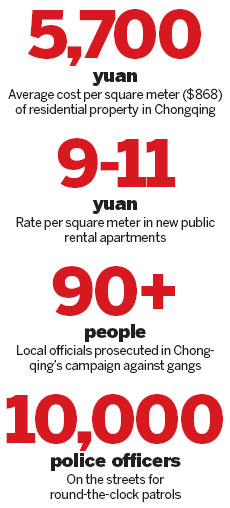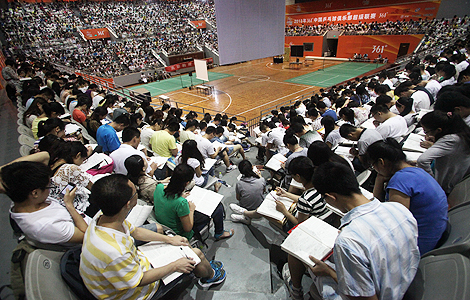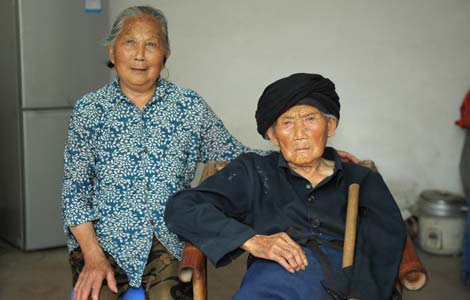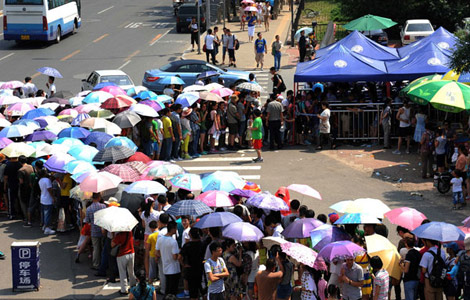

 |
|
Li Jianjun, center, applies Feb 17 for one of 67,000 public-rent apartments. Chongqing aims to help 2 million people, one-third of the population in its urban center, with the public housing project by the end of 2015. [Photo/China Daily] |
State-level support
Rhetoric aside, the drama reflects an implicit conflict over the current mode of development, said Chen Yongmiao, a lawyer and political analyst in Beijing.
The Chongqing model calls to mind some aspects of a bygone past, Chen said, "but it's not a period we can return to in the context of three decades of reform . . . I see it as a special version of the 'post-reform model'."
At the State level, three of the nine members of the Standing Committee of the Politburo of the CPC Central Committee - Vice President Xi Jinping, Li Changchun and Zhou Yongkang - have praised Chongqing's cultural drive in their respective visits. Xi said it is a "good platform" to educate the Party's cadres as well as the people at large.
Back in Chongqing, the "red campaign" caters to a niche market - retirees, whose singing of "red songs" has an element of nostalgia.
In the city's Shaping Park, what started as spontaneous attempts by aging folks to hang out together has been structured as a 90-minute morning gathering of retirees to sing "red songs" three times a week. The change was organized by the arts division of the publicity department in Shapingba district.
Chen Yali, a 52-year-old school retiree who takes part in a neighborhood "red band", said their gathering is anything but political. "We've all been through the same era. We learned to sing these songs as kids, and now we're all retired. It just feels good to be here with people, singing."
A 27-year-old observer, bank manager Zhou Xinzhi, said the red campaign "may have overdone things here and there". But he said its effects on ordinary life have been minimal and that "the streets are indeed safer".
Beating the dark
Chongqing's campaign against gangs, the most shocking and persistent this nation has seen in decades, according to the official Chongqing Times newspaper, began as a televised police chase-style crackdown - blue lights and sirens at full tilt - on prevalent underground weapons arsenals in 2009.
So far, the clampdown - which local government nicknamed da hei (beat the dark) - has brought down the city's former deputy police chief of 17 years, who was later executed for accepting bribes, shielding gangs, rape and failing to account for his cash and assets, and has prosecuted more than 90 other local officials, according to Xinhua. It has taken apart 375 gangs and detained more than 3,300 people. A new mayor, Huang Qifan, has taken office.
Also starting in 2009, Chongqing's public security bureau incorporated multiple functions - traffic control, criminal law enforcement, public security administration and public service - into the same police force.
As a result, 350 patrolling and traffic control stations have been set up and 193, or about 14 percent of all local police stations, were shut down. Nearly 10,000 police officers are now able to go to the street to support a round-the-clock patrolling system.
Homes for 2 million

One goal of the restructured police force is to make life safer for the 32 million people - roughly equivalent to the population of Canada - who live in the 80,000 square kilometers that make up this hub of Southwest China.
Chongqing aims to help 2 million people, one-third of the population in its urban center, with the public housing project by the end of 2015. It will bring down rent by about 40 percent at current rates, to 9-11 yuan per square meter.
Local policymakers say the initiative is expected to primarily benefit Chongqing's rural migrant workers like Tang, who has a rural residence permit but works in the city.
Throughout the city's massive countryside, about 1.4 million people live in sheer poverty, earning no more than 1,196 yuan a year - just under half of the globally recognized poverty line of $1 a day. Almost half of Chongqing's 40 districts and counties, including Tang's native Zhongxian county, are officially categorized as poor by State and provincial standards.
Tang, a bachelor, said he could continue living in the two-bed dorm room that his employer offers, but it is too far from the city center. He has applied to live in a one-bedroom apartment in Da Zhulin, one of the 21 public-rent neighborhoods the city has built or is building.
The initial application period for the 67,000 new apartments opened on Feb 12 and closed Monday, just two days before the lottery. As of 4 pm Monday, qualified applicants for the housing totaled 15,729.
"It's best if I get it (on Wednesday)," Tang said. "If not, I'll just have to wait it out." He stressed, however, that he hopes to eventually buy a public-rent apartment. Under local regulations, a tenant can buy an apartment after renting it for five years. The price is based on the flat's construction cost.
Yu Chenkang contributed to this story.







